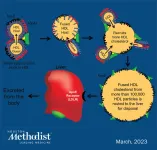(Press-News.org) A high blood caffeine level might curb the amount of body fat a person carries and their risk of type 2 diabetes, suggests research published in the open access journal BMJ Medicine.
In light of their findings, the potential role of calorie free caffeinated drinks for lowering the risks of obesity and type 2 diabetes is probably now worth exploring, say the researchers.
Previously published research indicates that drinking 3-5 daily cups of coffee, a rich source of caffeine, is associated with a lower risk of type 2 diabetes and cardiovascular disease, note the researchers. An average cup of coffee contains around 70–150 mg caffeine.
But most of the published research to date has concerned observational studies, which can’t reliably establish causal effects, because of the other potentially influential factors involved, point out the researchers.
What’s more, it’s difficult to disentangle any specific effects of caffeine from the other compounds included in caffeinated drinks and foods, they add.
To try and overcome these issues, the researchers used Mendelian randomisation to find out what effect higher blood caffeine levels have on body fat and the long term risks of type 2 diabetes and major cardiovascular diseases—coronary artery disease, stroke, heart failure, and irregular heart rhythm (atrial fibrillation).
Mendelian randomisation is a technique that uses genetic variants as proxies for a particular risk factor—in this case blood levels of caffeine—to obtain genetic evidence in support of a particular outcome—in this study, weight (BMI) and type 2 diabetes risk.
The researchers looked at the role of two common genetic variants of the CYP1A2 and AHR genes in nearly 10,000 people of predominantly European ancestry, who were taking part in 6 long term studies. The CYP1A2 and AHR genes are associated with the speed of caffeine metabolism in the body.
People who carry genetic variants associated with slower caffeine metabolism drink, on average, less coffee, yet have higher levels of caffeine in their blood than people who metabolise it quickly to reach or retain the levels required for its stimulant effects.
The results of the analysis showed that higher genetically predicted blood caffeine levels were associated with lower weight (BMI) and body fat.
Higher genetically predicted blood caffeine levels were also associated with a lower risk of type 2 diabetes.
The researchers then used Mendelian randomisation to further explore the extent to which any effect of caffeine on type 2 diabetes risk might principally be driven by the concurrent weight loss.
The results showed that weight loss drove nearly half (43%) of the effect of caffeine on type 2 diabetes risk.
No strong associations emerged between genetically predicted blood caffeine levels and the risk of any of the studied cardiovascular disease outcomes.
The researchers acknowledge various limitations to their findings, including the use of only two genetic variants, and the inclusion of only people of European ancestry.
But caffeine is known to boost metabolism, increase fat burning, and reduce appetite, they explain. And a daily intake of 100 mg has been estimated to increase energy expenditure by around 100 calories a day, which could consequently lower the risk of developing obesity.
“Our mendelian randomisation finding suggests that caffeine might, at least in part, explain the inverse association between coffee consumption and risk of type 2 diabetes,” write the researchers.
“Randomised controlled trials are warranted to assess whether non-caloric caffeine containing beverages might play a role in reducing the risk of obesity and type 2 diabetes,” they conclude.
END
High blood caffeine level might curb amount of body fat and type 2 diabetes risk
Exploration of potential role of calorie free caffeinated drinks may now be warranted, say researchers
2023-03-15
ELSE PRESS RELEASES FROM THIS DATE:
TikTok health information videos on Mpox often inaccurate and of poor quality
2023-03-15
Health information on M(onkey)pox, posted on the social media platform TikTok, is often inaccurate, incomplete, and of poor quality, finds a recent analysis of relevant videos, published in the open access journal BMJ Global Health.
The findings highlight the potential risks of using social media for health information, particularly during public health emergencies, warn the researchers.
Mpox, formerly called monkeypox, usually describes fever, swollen lymph glands (lymphadenopathy), and painful skin pustules all over the body ...
Altered “neuronal avalanches” in brains of epilepsy patients tied to cognitive performance
2023-03-15
New research by the Human Brain Project has found that in the brains of patients with epilepsy, changes in large scale neuronal activations can be detected in the brain’s resting state activity, even when no seizure is ongoing. The non-invasive approach could lead to a new method to aid epilepsy diagnostics.
Diagnosing epilepsy can be problematic for patients, who sometimes have to wear helmets and electrodes for prolonged periods of time waiting for an epileptic episode to happen, so that the clinicians can document it with EEG. Alternatively, the seizure is artificially induced, causing discomfort.
The new ...
Neolithic ceramics reveal dairy processing from milk of multiple species
2023-03-15
A new study has found evidence of cheesemaking, using milk from multiple animals in Late Neolithic Poland.
The research suggests that early farmers reduced the lactose content in milk by making it into cheese or other dairy products like yoghurt, and used dairy products from a number of different animals, such as cows, sheep or goats.
Lactose intolerance was a common condition in almost everyone in Europe during the Neolithic and until the Late Bronze Age when the genetic mutation became widespread, enabling adults to produce lactase, the enzyme which breaks down lactose in the body.
Researchers looked at the practice of dairy processing ...
Community health workers can help protect pregnant women and their babies from malaria
2023-03-15
Community health workers can make a great difference in increasing the number of pregnant women who receive life-saving preventive antimalarial treatment, according to a study conducted in four sub-Saharan African countries and led by the Barcelona Institute for Global Health (ISGlobal), an institution supported by “la Caixa” Foundation. The findings, published in The Lancet Global Health, will help to guide malaria control strategies in pregnant women and improve maternal and infant health in malaria-endemic ...
Robots can help improve mental wellbeing at work – as long as they look right
2023-03-15
Robots can be useful as mental wellbeing coaches in the workplace – but perception of their effectiveness depends in large part on what the robot looks like.
Researchers from the University of Cambridge carried out a study in a tech consultancy firm using two different robot wellbeing coaches, where 26 employees participated in weekly robot-led wellbeing sessions for four weeks. Although the robots had identical voices, facial expressions, and scripts for the sessions, the robots’ physical appearance affected how participants interacted with it.
Participants who did their wellbeing exercises with a toy-like robot said that they felt more of a connection ...
Knowing your ants from your anteaters: are wildlife documentaries showing us the ‘real’ natural world?
2023-03-15
Wildlife documentaries miss an opportunity to highlight the diversity of nature by focusing too much on mammals and birds, according to a new study.
In a new study published in People and Nature, researchers from the University of Cambridge have shown that while the production of wildlife documentaries has exploded over recent decades, they portray a biased view of the natural world around us.
Our natural world is under threat, from habitat and biodiversity loss, to high extinction rates. At the same time, there is a growing disconnect between people and nature, with children’s opportunities to experience the natural world diminishing.
Now more ...
Propeller advance paves way for quiet, efficient electric aviation
2023-03-15
Electrification is seen as having an important role to play in the fossil-free aviation of tomorrow. But electric aviation is battling a trade-off dilemma: the more energy-efficient an electric aircraft is, the noisier it gets. Now, researchers at Chalmers University of Technology, Sweden, have developed a propeller design optimisation method that paves the way for quiet, efficient electric aviation.
In recent years, electrification has been described as having an important role in reducing emissions from future aviation. Due to the challenges posed by longer ranges, interest is chiefly focused on electric propeller planes covering shorter distances. Propellers connected to ...
People of color have been largely underrepresented among authors published in the American Journal of Archaeology
2023-03-14
A new demographic survey of authorship in the American Journal of Archaeology (AJA) reveals that people of color have been largely underrepresented among the scholars published in the journal. The results of the survey, which also found that authors who are the children of people without advanced degrees were also underrepresented in the journal’s pages, are published in the paper “Demographic Dynamics of Publishing in the American Journal of Archaeology.” The study was conducted ...
Common cold gives children immunity against COVID-19
2023-03-14
During the pandemic, medical doctors and researchers noticed that children and adolescents infected with COVID-19 became less ill than adults. A possible explanation for this is that children already had a prior level of immunity to COVID-19 provided by memory T cells generated by common colds.
After studying unique blood samples from children taken before the pandemic, researchers from Karolinska Institutet in Sweden have now identified memory T cells that react to cells infected with SARS-CoV-2, the virus that causes COVID-19.
Four coronaviruses cause common colds
A possible explanation for this immunity in children is that they already had colds caused by one of the four coronaviruses ...
Researchers discover way to reverse infertility by reducing HDL cholesterol
2023-03-14
Houston Methodist scientists reversed infertility in sterile mice by reducing high-circulating cholesterol with a bacterial protein, showing further evidence that links high cholesterol to female infertility. This is a promising development, with one in every five women of childbearing age in the U.S. unable to get pregnant after trying for a year.
“We are working with a protein, called serum opacity factor, with unique characteristics,” said Corina Rosales, Ph.D., assistant research professor of molecular biology in medicine with the Houston Methodist ...
LAST 30 PRESS RELEASES:
Nanoplastics can interact with Salmonella to affect food safety, study shows
Eric Moore, M.D., elected to Mayo Clinic Board of Trustees
NYU named “research powerhouse” in new analysis
New polymer materials may offer breakthrough solution for hard-to-remove PFAS in water
Biochar can either curb or boost greenhouse gas emissions depending on soil conditions, new study finds
Nanobiochar emerges as a next generation solution for cleaner water, healthier soils, and resilient ecosystems
Study finds more parents saying ‘No’ to vitamin K, putting babies’ brains at risk
Scientists develop new gut health measure that tracks disease
Rice gene discovery could cut fertiliser use while protecting yields
Jumping ‘DNA parasites’ linked to early stages of tumour formation
Ultra-sensitive CAR T cells provide potential strategy to treat solid tumors
Early Neanderthal-Human interbreeding was strongly sex biased
North American bird declines are widespread and accelerating in agricultural hotspots
Researchers recommend strategies for improved genetic privacy legislation
How birds achieve sweet success
More sensitive cell therapy may be a HIT against solid cancers
Scientists map how aging reshapes cells across the entire mammalian body
Hotspots of accelerated bird decline linked to agricultural activity
How ancient attraction shaped the human genome
NJIT faculty named Senior Members of the National Academy of Inventors
App aids substance use recovery in vulnerable populations
College students nationwide received lifesaving education on sudden cardiac death
Oak Ridge National Laboratory launches the Next-Generation Data Centers Institute
Improved short-term sea level change predictions with better AI training
UAlbany researchers develop new laser technique to test mRNA-based therapeutics
New water-treatment system removes nitrogen, phosphorus from farm tile drainage
Major Canadian study finds strong link between cannabis, anxiety and depression
New discovery of younger Ediacaran biota
Lymphovenous bypass: Potential surgical treatment for Alzheimer's disease?
When safety starts with a text message
[Press-News.org] High blood caffeine level might curb amount of body fat and type 2 diabetes riskExploration of potential role of calorie free caffeinated drinks may now be warranted, say researchers



